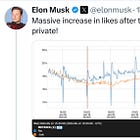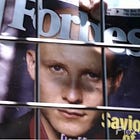Bidding Farewell To Twitter, Which Elon Musk Turned Into Gentrified Klan Rally
A Black Twitter homecoming service
Twitter is gone. It vanished more than two years ago when Elon Musk paid $44 billion for the social media platform and eventually the world. Few investments pay off so quickly.
Donald Trump leveraged Twitter for his own twisted purposes, inspiring the worst elements on the platform. He spread Birther lies on the site three years before Barack Obama posted his first tweet.
Twitter was launched in 2006, and by 2010, it was obvious that the platform was more popular with Black people, who accounted for an estimated quarter of all total users. That’s more than double the percentage of Black people in the United States.
“White flight” was present even in the digital space, as white users abandoned MySpace en masse after Black users started to make themselves to at home. More than a few white users claimed the site had gone “ghetto.” Author Dana Boyd, in her book White Flight in Networked Publics – How Race and Class Shaped American Teen Engagement with MySpace and Facebook, described unkempt MySpace profiles “covered in spam, a form of digital graffiti … As MySpace failed to address these issues, spammers took over like street gangs.”
White people moved in large numbers to Facebook, often referred to as a “digital gated community.” (Membership was originally restricted to people with a college email address.) Black people quickly gravitated to Twitter, where you could follow and interact with anyone. Although this would later prove its downfall, initially it broadened and democratized the conversation. Twitter’s format was ideal for storytelling, and Black users introduced our own unique cultural elements like “call and response” and “clapbacks” that drove engagement on the platform.
How Black Was My Black Twitter?
The Internet in its early days was like a digital pool party, and most Black people had limited access. According to a 1998 Pew Research study, white Americans were almost twice as likely as Black Americans to use the Internet. Former President Bill Clinton offered a prescient warning in a speech at MIT: “History teaches us that even as new technologies create growth and new opportunity, they can heighten economic inequalities and sharpen social divisions.”
Barack Obama’s first tweet was dated May 18, 2015. “Hello, Twitter!” he wrote. “It’s Barack. Really! Six years in, they’re finally giving me my own account.”
The water was already warm when Obama arrived at the party. A 2013 Pew survey revealed that 40 percent of Black Internet users between the ages of 18 to 29 were on Twitter, compared with 28 percent of their white counterparts.
The term “Black Twitter” soon emerged as a media shorthand for Black engagement on Twitter. Some white users thought it was an entirely different site and would even ask in earnest for the special URL, but Black Twitter was a destination that didn’t require a passport, a hopping party without a cover charge.
Ashley Weatherspoon blew up Twitter in September 2009 with the hashtag #uknowurblack. Within hours, Black users across the platform were adding their own personal fuel to the meme, and everyone paid attention. This didn’t surprise Weatherspoon.
“Our experience is universal,” she explained. “Our experience is big. Our experience is relevant.”
Black Twitter functioned as a digital family cookout. There were jokes, fierce shade, but also compassion and fellowship. The live tweet watch parties for ABC’s Scandal were so popular that star Kerry Washington participated. The community was there when Michael Jackson died and when Trayvon Martin was murdered.
In those days, Twitter’s algorithms didn’t have a far-right political agenda, so hashtags from Black Twitter users frequently made Twitter’s list of trending topics. This included the hilarious #ThanksgivingWithBlackFamilies, #DuragHistoryWeek, #CelebritiesOnlyBlackPeopleKnow, #AskRachel, and #GrowingUpBlack.
Black Twitter didn’t just comment on the news. It shaped the cultural conversation. Many common figures of speech (“wild goose chase,” “brave new world,” “green-eyed monster,” “break the ice” …) first appeared in Shakespeare’s plays, and so many classic catchphrases (“This you?,” “tea,” “slay”) were popularized on Black Twitter. (This is also how you wound up with IHOP’s weird “pancakes on fleek” post.)
Most importantly, Black Twitter was an online meeting space for political activism. Citizen journalist Johnetta Elzie tweeted on the ground in Ferguson, Missouri, in 2014. After Trayvon Martin’s killer was acquitted, Alicia Garza posted the words “Black Lives Matter,” which eventually became a viral Twitter hashtag and the start of a movement. That same year, author CaShawn Thompson tweeted the phrase “Black girls are magic,” a powerful sentiment Michelle Obama would embrace.
When activist and writer April Reign created the viral hashtag #OscarsSoWhite in 2015, it sparked lasting change at the staid Academy Awards. The hashtag #TakeItDown accelerated the push to remove the Confederate flag from South Carolina’s state capital. The hashtags #ICantBreathe and #SayHerName also had an impact that extended beyond the Twitter platform.
Black Twitter served a vital role during the growing racial backlash after Obama’s election. Every Black person with a smartphone now had their own digital printing press and could publicly expose busybody “Karens” and abusive police officers. Ferguson, Trayvon Martin, and George Floyd were all stories that were elevated to the mainstream through Black Twitter. The once informal digital cookout had become a potent source of community organizing against racial injustice, both small and large.
Black Twitter wasn’t just a separate but equal Twitter. It was Twitter — the crying Jordan memes, the viral hashtags, the crazy story threads (one actually became a movie). Twitter owes much of its success to Black users, who contributed significant intellectual property for limited return. Yet the tech space — especially in Twitter’s early corporate days — is disproportionately, almost blindingly white.
Twitter founder and former CEO Jack Dorsey recruited several prominent Black employees and seemingly prioritized diversity, equity, and inclusion — a practical business choice so that Twitter could fully understand its unique user base. But he proved an unreliable ally, failing to maintain a safe environment for users, as certain demographics became the target of relentless abuse. Selling Twitter to Elon Musk meant ignoring Musk’s plainly stated agenda to make the platform less welcome for marginalized groups. That was undeniably a betrayal from the man who once tweeted “I Love #BlackTwitter.”
After his shock purchase of Twitter, Musk, an obsessive foe of “wokeness,” steadily dismantled everything that made Black Twitter special. Under the guise of “free speech absolutism,” Musk restored the accounts of users who were banned because they were abusive or willingly spread disinformation, including the president-elect. People of color and women in general were heightened targets for harassment. The Twitter party was over, and the platform’s new name — X — only punctuated the finality.
I’ve been reluctant to surrender Twitter to Musk, which he renamed “X” because he’s as good at brand marketing as he is at everything else. This thriving online community influenced and dominated American culture and politics for more than a decade. We couldn’t just let it end.
But Black Twitter has ended. It’s been laid to rest underneath a crushing mountain of right-wing detritus. Now, it’s time to honor Black Twitter’s memory and finally move on to bluer skies ahead.










This is a great article and I miss Black Twitter.
Because of the need for engagement, a number of people have ignored Spoutible, which is lefty-owned (and could be invested in...I am a small-ball investor in it for $100). The mechanics of Spoutible and its lack of algorithm make it a poor environment for chuds and other cranks and that kinda starves out the dunking ecosystem. This is despite it having a better feature set than its competitors.
I predict Bluesky, once leadership gets more amenable to shittiness, to take the same route as Xitter. I recall Jack Dorsey was begged over the years to ban the Nazis and he never really did.
I left Twitter when Elno Mush bought it, because I knew that he would ruin it for everyone but the racists. Not joining Bluesky or any other social media site, as I don't want to. It seems that every site ends up ruined, even if not intentional, as in the case of Twitter, because of trolls, and the sites have no idea how to stop it.